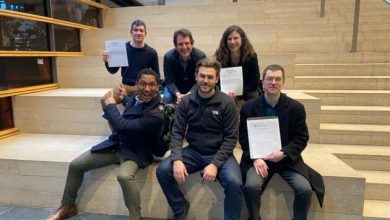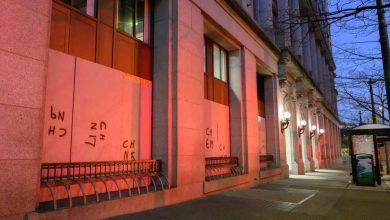Exit interview: Seattle Mayor Jenny Durkan on the pandemic, Amazon, and combating town council
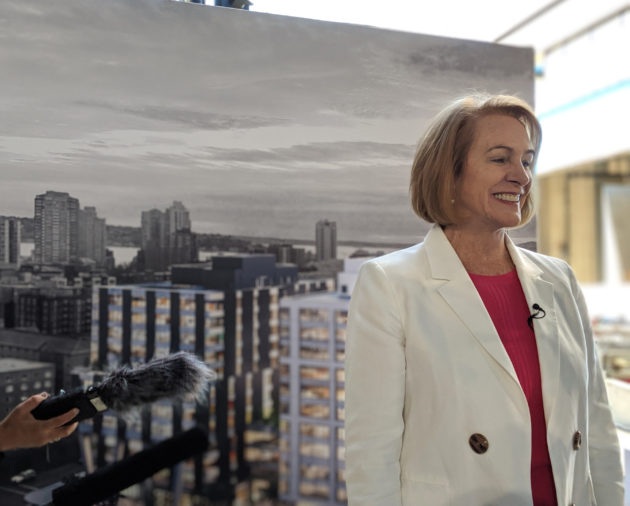
To suggest that Seattle Mayor Jenny Durkan had a pressurized run as the Emerald City’s top elected official is to badly understate her tenure.
Drafted into office after a disgraced former mayor resigned and then faced with meteoric-yet-destabilizing growth, a worldwide pandemic, generational social unrest and a city council that had very different ideas about governance, Durkan’s weathered run in local history is unlike any of her predecessors.
Fights over police reform, over unaffordable houses, over the civic duty of the city’s largest employer in Amazon, and over how to balance compassion for the unhoused population against a frustrated business community, dominated her tenure — one she elected to end without seeking re-election.
Durkan, a former U.S. attorney and number one Seattle Storm fan, spent time with GeekWire recently to talk about her time as mayor. (And no, she’s not going to miss the city council one bit.) The interview has been edited for brevity and clarity.
GeekWire: It’s been a pretty uneventful term as mayor, wouldn’t you agree?
Durkan: It has been one of the quietest terms of mayor that the city’s ever experienced (laughs). The word unprecedented, I think, doesn’t even capture these last two years. It has been probably the most consequential period of time in the city’s history.
GW: Do you feel like there are things that the city handled particularly well during the pandemic and things that you wish the city had handled differently?
Durkan: When history is written, Seattle will be the city that is recognized for doing it right. We were the first in — with no roadmap, no real federal assistance, no access to testing — and within weeks, we could have had 70,000 cases and thousands of deaths. It required us to pivot and innovate almost instantaneously. And I think that we can be very proud of what we accomplished.
We were able to stand up a vaccine program where we’ve now had 320,000 vaccines by the City of Seattle. Ninety percent of Seattle residents 12 and older have at least started the vaccine. We knew it was the only way to really curtail [COVID-19]. We set up a testing program that had 1.2 million free tests and almost 60% of our residents used it. The result is we have the lowest number of cases, of hospitalizations and death rate of any city in America. That is a remarkable accomplishment.
GW: Your term is, essentially, a tale of two cities, starting with an enormous tech boom that led to some specific problems. And then the pandemic. How do you think the business community is going to view your legacy as mayor?
Durkan: Our small businesses were the first hit in the pandemic, but it was our partnerships with large businesses, and them agreeing to work from home almost instantaneously, that gave our region the period of time it needed to address the other parts of the pandemic. Even through the pandemic, we have seen that the important connections we’ve had with the business community have really benefited the people of Seattle.
Almost every business has been grappling with the same issues the city has, and the pandemic has almost eclipsed every other issue they’ve had as a business. It doesn’t mean that they haven’t had to maintain and continue their lines of business. But as a backdrop, if they didn’t get that right, nothing else was possible.
And so I think there’s a strong recognition among businesses — not just here locally, but nationally — that Seattle was a real leader and continues to be a leader. I also think it shows what we can do as a city, when we actually work with businesses, large and small, to tackle a really big problem.
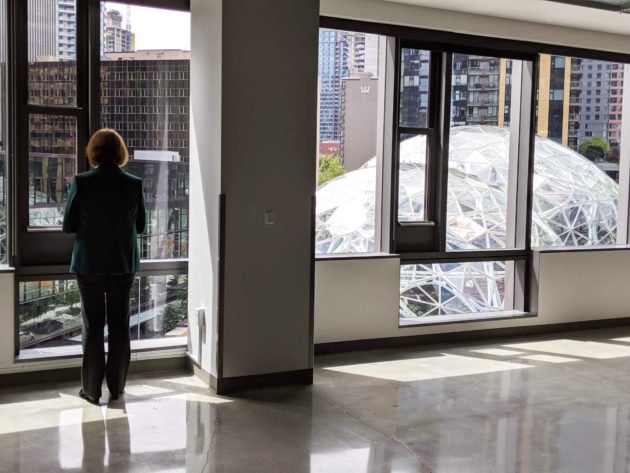
GW: Let’s go back pre-pandemic to the payroll tax, also known as the Amazon head tax. It turned into a pretty thorny problem for your office as well as the city council. Do you feel like that problem was more a policy-related issue? Or do you feel like it was more of a political issue?
Durkan: I think it’s none of the above. Going back to your previous question, when I came in (to the mayor’s office) there was no question that the tech boom had changed the face of our city. We were the fastest growing city in America. The population we were adding, for the most part, was very highly compensated, younger tech workers.
That created enormous disparity in our city because the cost of housing skyrocketed so much. We’re in a time that is more displacing than the Industrial Revolution, and the pandemic accelerated that impact. So if you go back before the pandemic, we were very focused on having a range of partnerships with the business community that could really address that.
Number one, the Seattle Promise program to really focus on how do we provide education to Seattle students, and get them to a place where they can compete in the new economy. Second, look at our Innovation Advisory Council, which served as a really great platform for us to get to know businesses. I think that there was a large recognition among businesses themselves that we had to change what was happening in our city in order for them to have a place where their workers want to work.
GW: What advice would you give to Bellevue, which is now courting that same sort of growth Seattle had in South Lake Union. There’s a lot of suspicion among developers and housing advocates that they’re not as well prepared.
Durkan: You’re going to have the growth at the same time the light rail starts to open up there. I would give advice not just to them but to the other suburban cities. We saw that when there was pressure placed on Seattle, the housing pressure moved rapidly to suburban areas. One of the highest increases in the cost of a home is in Tacoma. So housing, housing, housing.
When you have this influx of new people come to work for new technology companies in a city, a new economy, it will put enormous pressure on your housing market. It will skew that market so that suddenly the cost of housing is so much more expensive than the people who are living there can afford. There’s got to be just an all-out focus on affordable housing and the missing middle (income housing).
You must have a city where your teachers and your firefighters and your restaurant workers can actually afford to live. And that became out of reach for the city of Seattle and will increasingly be so in not just Bellevue, but Redmond and other cities.
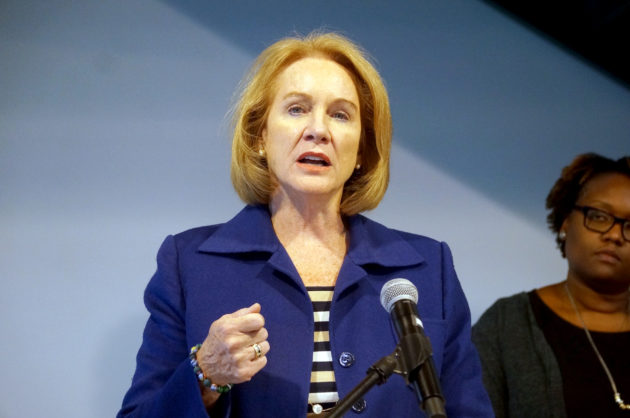
GW: What would you point at and say, ‘This is something that actually moved the needle in regard to affordable housing’?
Durkan: I am enormously proud that even in these turbulent times, we focused on housing. In my four years as mayor, we announced $2.5 billion in new affordable housing, 7,600 new units, probably the most productive time of affordable housing in the city’s history, under the housing levy. We also did MHA (Mandatory Housing Affordability) which I think was really important to make sure that development pays for the cost of development.
We also looked at new strategies, for example, the rapid acquisition of apartment buildings that were already built. As you know, (new construction) takes about two to three years from permitting to construction and can cost $300,000 plus per unit. That’s just not scalable. And so we had to look for other alternatives.
GW: Recently at the GeekWire Summit, Amazon CEO Andy Jassy criticized his company’s relationship with the city of Seattle. What’s your impression of that relationship? And what should the city do, if anything, to improve that relationship?
Durkan: I thought actually Andy’s interview was very focused on the city council. We have had a very positive working relationship (with Amazon), which doesn’t mean I don’t think they don’t have to step up because I think there’s ways Amazon can step up for Seattle and for other cities.
And they have done so. Recently, they gave a significant contribution to the waterfront park, for example, which is really going to transform the city of Seattle. They were the ones who contributed to the four-year scholarship program for computer scientists that we just created for Seattle Colleges. But all of those relationships have to be attended to and people have to be willing to sit in a room and talk to one another.
GW: What advice would you give incoming mayor Bruce Harrell about the job, and specifically about dealing with the city council? He’s getting a slightly changed council from what you had, but largely the same group of people.
Durkan: I think that there’s no question that in the past two years, on certain topics, there was not agreement between (me) and the city council. Seven of the (nine) members immediately wanted to defund the police by 50%. (Former Police Chief Carmen Best) and I opposed that because we thought it would be bad for public safety. I think we were correct. We also had disagreements in the area of homelessness, on how to bring people inside and to make sure that our public parks can be enjoyed by people.
It doesn’t mean you can’t and shouldn’t stand up as many alternatives to armed police response as you can. And we’ve been doing that. But you also need police. Bruce Harrell, from the very beginning, (should) have regular meetings with city council members to find ways to focus on what (is) agreed upon.
And so I think you really have to move forward. And I really hope that the city council has turned a page on those fights, and that they will be more responsive to what is clear that the people of Seattle want.
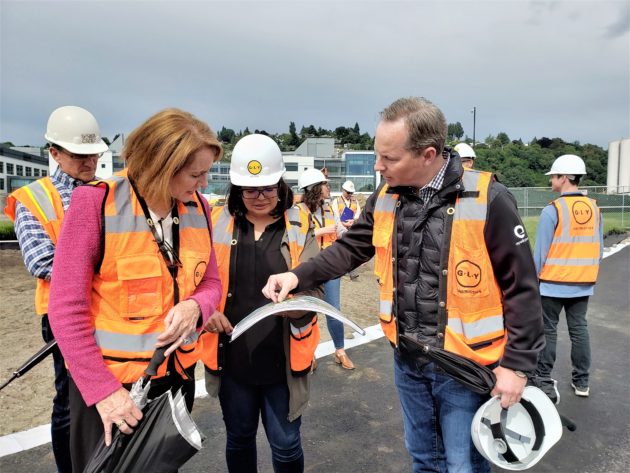
GW: What would you what would be at the top of your list if you were going to be doing another term?
Durkan: Number one, still the pandemic. The virus is not done with us. We don’t know how severe the disease is or what it does with people who are fully vaccinated or boosted. But Omicron is growing and we’ve seen countries closed down, universities closed down. Number one is, the mayor has to be focused on that.
Number two, obviously, our downtown recovery is going to be critical. We started this summer, and then we had this wave with Omicron. There’s going to be a real focus on downtown recovery. How do you get those small businesses back? It’s a chicken-or-egg thing where you need workers who provide that daily foot traffic. So many companies are going to continue a work-from-home atmosphere. We’ve got to work with our large employers to figure out how we get their employees back.
We have to work with our small businesses to see how they’re going to be robust. And we have to work with the Downtown Seattle Association, small businesses and others to make sure that we really improve public safety and homelessness in the downtown core.
GW: A two-part, final question: Are you going to miss the job? Are you going to miss the city council?
Durkan: (Laughs). There are parts of this job that are just phenomenal. My favorite part of this job, bar none, is getting out of City Hall and meeting with people. I love going into different parts of the city and sitting down and talking to people about what was happening in their lives and how government can make it better. And I took a great deal of satisfaction and joy on things we could do to make a positive impact on people’s lives and communities. I will miss that part of it.
The real focus going forward with a new mayor coming in is for the council and the mayor to turn the page in to be really just focused on what the people need right now. They want us to keep successfully fighting the pandemic. They’re concerned about the public safety and the loss of police officers. They want the new homeless regional authority to succeed.
GW: I’ll take that as a yes, you’ll miss the job and ‘no comment’ on missing the city council.
Durkan: I just think that the areas we had conflict in, the voters spoke. They expect this council and this mayor to get to work to fix things.
Conclusion: So above is the Exit interview: Seattle Mayor Jenny Durkan on the pandemic, Amazon, and combating town council article. Hopefully with this article you can help you in life, always follow and read our good articles on the website: Doshared.com
